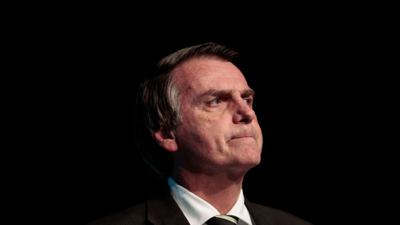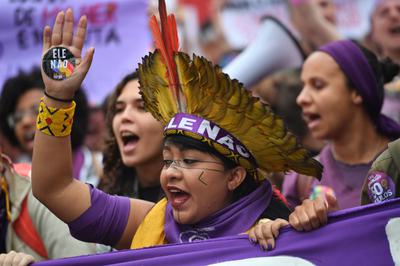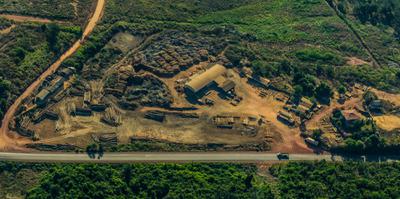If Bolsonaro’s scenarios play out, the deforestation rate in the Amazon — already on the rise in recent years — could nearly triple.
With Bolsonaro’s ascension, Brazil — home to the largest rainforest in the world — is facing an “Apocalypse Now” moment for the Amazon. When he takes office on January 1, Bolsonaro — with deep support in Brazil’s Congress, military, and agribusiness sector — has vowed sweeping changes. These include an effective end to environmental licensing for infrastructure projects, which would open up vast areas of the already beleaguered Amazon to development, and a ban on creating new protected areas or indigenous territories. If these scenarios play out, the deforestation rate in the Amazon — already on the rise in recent years — could nearly triple, according to a recent study. This environmental disaster would unfold at a time when climate change and diminishing rainfall already pose a serious threat to the Amazon, whose vast stores of carbon could be released to the atmosphere.
Unfortunately, Brazil’s election results showed that the environment was an insignificant issue for most voters. Indeed, public concern with environmental issues has been declining in Brazil for some time. Since 2014, this decline has been palpable. For example, the vote for former environment minister Marina Silva in the first round of the presidential election fell from 21 percent in 2014 to 1 percent in 2018. Polls commissioned by the World Wildlife Fund (WWF) in 2014 and 2018 showed that “the environment and natural wealth” fell from 58 percent to 39 percent as a point of national pride during this period. A poll in April 2018 found that 75 percent of the population fears that Brazil is at risk of being invaded by a rich country because of its immense natural wealth. This adds appeal to Bolsonaro’s portrayal of environmental concerns as threats to national sovereignty.
Given the wave of conservative victories in this year’s elections for the National Congress, constitutional impediments to parts of Bolsonaro’s agenda could be removed with ease. Amending the constitution in Brazil is much easier than in most countries; the current constitution has been amended 99 times since it came into effect in 1988. The newly elected conservative deputies and senators could accelerate approval of a series of proposed laws and constitutional amendments now advancing through the legislative process that would effectively eliminate environmental licensing, as well any new protected areas or indigenous lands. One of Bolsonaro’s campaign promises was to not allow demarcation of “a single centimeter more of indigenous land.”
An indigenous woman protests against then-candidate Jair Bolsonaro, who has promised to ban the creation of new protected areas or indigenous territories, in Sao Paulo in October. NELSON ALMEIDA/AFP/Getty Images
The president of the lower house of Congress has announced that 11 pieces of legislation supported by Bolsonaro, including some of his environmental initiatives, will be fast-tracked through the committee process to allow plenary votes even before the president-elect takes office on January 1, 2019. Bolsonaro’s congressional strategy heavily depends on the “ruralist” (large landholder) voting block, a group that has played a major role in carving up the Amazon for agricultural projects, from large soybean farms to cattle operations.
Both as a candidate and as president-elect, Bolsonaro has stated that the military will have an important role in his administration. Appointment of military men to manage infrastructure is expected to shift the balance of power in some regulatory agencies.The vice president-elect is a retired general and several of Bolsonaro’s ministerial appointments are military men. Many of his close political allies are military, such as Sergio Olímpio Gomes (known as “Major Olímpio”), who was elected senator from the state of São Paulo and who has promised to “sell” the country’s indigenous lands.
Bolsonaro has frequently called for an end to all “activists” and has vowed to expel international environmental organizations such as Greenpeace and WWF. He wants to alter Brazil’s anti-terrorism law to classify as terrorist organizations a variety of social movements, such as the Landless Rural Workers’ Movement, a leftist organization supporting land reforms. His proposed revision of Brazil’s “disarmament law” to allow weapons to be carried for “protection of rural properties” can be expected to lead to further violence in Amazonia, a region that is already the scene of thousands of rural murders, including those of environmental activists.
The Impact on Deforestation
The impact of Bolsonaro’s policies on the Amazon could be irreversible. Unlike administrative changes that can be undone in the future by another president, once ecosystems are destroyed and indigenous and other traditional communities are displaced or dispersed, they cannot be recreated.
Large infrastructure projects are key factors in Amazonian deforestation, unleashing processes that are often beyond government control.
Large infrastructure projects are key factors in Amazonian deforestation, unleashing processes that are often beyond government control. If Bolsonaro makes good on his promise to strip Brazil’s environmental agencies of their power to license infrastructure and other development projects, what remains of licensing would be distributed to the ministries in each subject area, such as Agriculture, Infrastructure (i.e., transport, etc.) and Mines and Energy (i.e., dams, etc.) — a formula for more environmental disasters. Brazil’s current environmental licensing is already woefully inadequate.
During his campaign, Bolsonaro repeatedly promised to merge the agriculture and environment ministries and to appoint a representative of agribusiness to head the new combined ministry. Bolsonaro’s pick to head the combined ministry denies the existence of anthropogenic climate change. Bolsonaro’s chief of staff stated that the fusion of the two ministries will indeed occur, but Bolsonaro has walked this back, saying that the environment ministry would remain intact but would be headed by someone who does not have a radical “Shiite character.”
A Global Warming Hotspot
Climate change is an especially key issue for the Amazon region. Bolsonaro does not accept the existence of anthropogenic global warming. He has forwarded (via WhatsApp) denialist materials to his base, much in the style of Donald Trump’s retweets. His three sons, all of whom are elected officials, are even more voluble in denouncing climate change as a foreign conspiracy to prevent Brazil from developing. In August 2018, one of Bolsonaro’s sons traveled to New York to meet with Steve Bannon, who was credited with convincing Trump to abandon the Paris Agreement in 2017.
An illegal logging in the Alto Turiacu indigenous territory in Brazil’s Maranhão State in 2015. Fábio Nascimento / Greenpeace
During his campaign, Bolsonaro repeatedly promised to withdraw Brazil from the agreement. Then, just before the runoff election, he appeared to walk this back. However, what he said was far from a reversal because it was conditioned on “someone” giving him a written guarantee that there would be no project for an ecological corridor connecting the Andes to the Atlantic and no “independence of any indigenous area.” Since no such guarantee can be expected to materialize, Bolsonaro may well move ahead with his vow to withdraw from the Paris Agreement.
Although climate denial is a powerful force in Brazil, the country is, ironically, expected to suffer disproportionately from climate change. For example, the Brazil 2040 report, which was prepared (and later suppressed) by the Dilma Rousseff administration in 2015, projected a substantial reduction in rainfall in eastern Amazonia by 2040, plus complete devastation of northeastern Brazil, a semi-arid region where periodic droughts have long driven out waves of migrants. A sharp, long-term decline in precipitation in the northeast could force an exodus of tens of millions of people who work on agriculture, with some moving into the Amazon and further driving deforestation.
Brazil’s abandonment of the Paris Agreement would be a serious setback to international efforts to contain global warming. It would also allow Brazil to renege on its commitment under the Paris accord to control deforestation in the Amazon. Infrastructure projects, such as highways opening vast areas to deforesters, would be free to advance. A calculation by researchers at Brazil’s National Institute for Space Research and the International Institute for Applied Systems Analysis in Austria indicates that, as a result of Bolsonaro’s proposals, annual deforestation rates in the Amazon would “quickly rise” to a level 268 percent above the 2017 rate.
Deforesters were euphoric as it became clear that Bolsonaro was headed to victory. This “Bolsonaro effect” even led to a 36 percent increase in Amazon deforestation during the 2018 campaign, as compared to the same period the previous the year. The presumption of impunity for ignoring environmental regulations can be expected to grow stronger after Bolsonaro takes office.
The Amazon is already believed to be near a tipping point in terms of the advance of deforestation. Another tipping point is approaching in terms of temperature. A global average temperature increase of 2 degrees Celsius (3.6 degrees Fahrenheit) above pre-industrial levels — the upper threshold set in the Paris Agreement — would unleash feedbacks that could destroy the forest.
The biggest factor constraining Bolsonaro will almost certainly be international pressure from the buyers of Brazil’s agricultural products.
The Amazon is not only a victim of these impacts but also a major player in possible actions to avoid a global climate catastrophe. The huge stocks of carbon in the forest biomass and in the soil under the forest can be released either through deliberate deforestation or through uncontrollable degradation driven by climate change. Release of any significant portion of these stocks would greatly lessen the chances of global actions successfully containing a “runaway greenhouse” effect where the earth warms and causes a snowball effect of self-reinforcing carbon release worldwide from warming soils, melting permafrost, reduced CO2 absorption by oceans, forest fires, forest death from insect outbreaks, and more.
Constraints on Bolsonaro?
While the outlook for the Amazon under Bolsonaro is grim, there may be some constraining factors. The military might start recognizing climate change as a national security issue and soften Bolsonaro’s environmental policies, as might religious leaders, since Bolsonaro is Roman Catholic.
But these are slender reeds of hope. The biggest constraining factor will almost certainly be international pressure from the buyers of Brazil’s agricultural products; Brazil is the world’s largest exporter of beef and the second largest exporter of soy. An example of Bolsonaro’s concern about agribusiness exports occurred after the election when he reversed his promise to merge the agriculture and environment ministries. Blairo Maggi, the current Minister of Agriculture whose family owns Brazil’s largest soy producer, had reportedly argued that some importing countries might impose restrictions on Brazil if the country so blatantly removed environmental controls.
One day, perhaps, even Brazil’s agribusiness sector — which is rife with climate denialism — might realize that the destruction of the Amazon will significantly accelerate climate impacts that are an existential threat to Brazilian agriculture. The key question now is whether the agricultural sector, and Brazil as a whole, will wake up in time to avoid “Apocalypse Now” in the Amazon.






For people concerned about the environment and climate change, U.S. President Donald Trump has proven to be as bad, or worse, than feared. He is in the process of pulling the United States out of the Paris Agreement, continues to flatly dismiss the science of human-caused global warming, and has worked ceaselessly to undo environmental regulations and weaken environmental agencies.
Now, however, a new leader has emerged on the world stage who is poised to do even more global environmental damage than Trump. He is Jair Bolsonaro, the recently elected president of Brazil, and his extreme views on the environment, coupled with his control of nearly all the country’s levers of power, means that he is now in a position to do unprecedented harm to the Amazon and the international battle to slow climate change.
Not for nothing is Bolsonaro known as the “tropical Trump.” The parallels are many, including their embrace of the far right and their inflammatory rhetoric. And among their similarities is the way that a constant barrage of outrageous comments diverts discussion from the environmental damage that their policies portend.
A 63-year-old retired army captain who had served as an undistinguished member of the lower house of Brazil’s National Congress, Bolsonaro won the October 28 presidential runoff. Marshaling an unprecedented social media effort, Bolsonaro’s campaign reflected his nationalist, authoritarian, racist, misogynistic, anti-press views. The vote represented a widespread rejection of the Workers’ Party, which had ruled Brazil for 13 years and was characterized by massive corruption scandals and an economic collapse. Brazil’s high crime rate made personal security a paramount issue, and Bolsonaro’s tough image appealed to many voters.